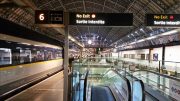Leave supporters voted in droves to cut immigration, but implementing this demand would be no easy task as Home Secretary Amber Rudd said when pushed this week on how it would be done.
Free movement of people within the European Union was rejected by those who successfully voted to leave the EU, she said, and the May-led government had to find a way to do that without damaging the economy.
“[What] the British public voted for was to make sure that we reduce immigration from the European Union … We have to work out how we can do that while promoting and protecting the economy.”
And that meant there would be exceptions. Top bankers had already been listed by Chancellor Philip Hammond. Mrs Rudd (pictured above) added health workers already working in the National Health Service, those working in the construction industry, scientists, academics and overseas students – putting the figure at about 200,000. Not the tens of thousands promised by the government and demanded by voters.
“Once we leave the European Union we will have complete control over who comes into the UK from the EU and who doesn’t – with one or two provisos, of course,” she told the BBC on Sunday.
“… I can’t tell you which portion of which area of immigration we’re actually going to drive down more than the other. That would be part of the negotiations to withdraw from the EU.”
But Mrs Rudd said the 57,000 people now working in the NHS would be protected. However, she refused to be drawn on what other groups might merit special status.
“What we’re going to look at is how we get the best for the economy, driving the numbers down but protecting the people who really add value to the economy.”
Concerns have already been raised about prospective cuts to overseas student visas – more than 100,000 of them – and the cost to national and local economies. Universities UK president Julia Goodfellow said recently that overseas students contributed nearly 3 per cent of UK GDP and generated more than 750,000 full-time jobs.
Mrs Rudd said the first thing the government would do was check that students coming to the UK were attending “real courses”.
“We’ve already closed eight to nine hundred bogus colleges, and we are raising the level at which you have to start earning once you leave the university so that you make a real benefit to the UK if you’re going to stay here. … There’s going to be no blanket banning of students coming to the UK, but we are looking at bringing down the numbers overall.”
She confirmed that there would be no Australian-based immigration points system.
However, Mrs Rudd did not rule out a system of work permits, saying it “has value”.
by Aban Contractor




